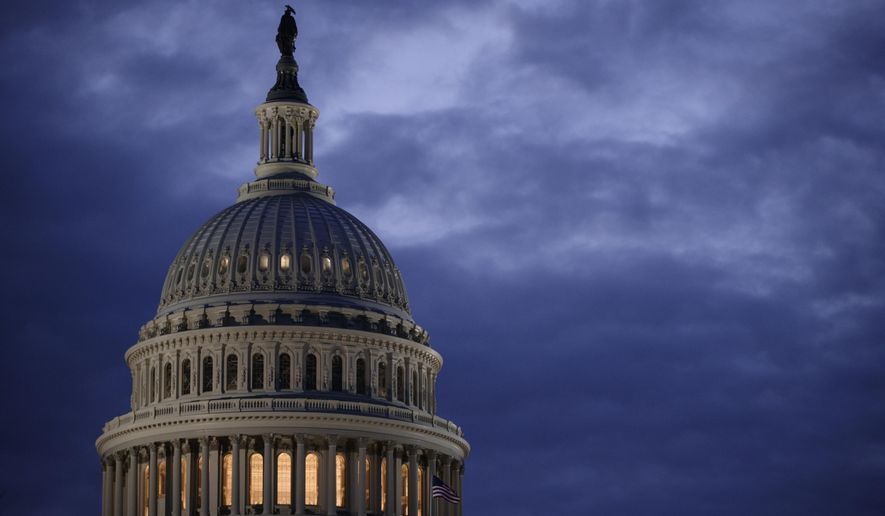Far from cutting loopholes, Republicans left the federal tax code just as messy after their $1.5 trillion overhaul last year, according to a new report from Congress’s official scorekeepers that signals President Trump and the GOP failed on one of their chief goals.
The new tax law repealed nine breaks but added 17 new ones. It also modified another 55 of the more than 200 special breaks embedded in the code, known as “tax expenditures,” according to the report from the Joint Committee on Taxation.
The law’s backers say despite the additional breaks, things are simpler now for most taxpayers, who no longer face “double taxation” on items like capital gains and inheritances, and who are more likely to claim the standard deduction, easing their paperwork burden each year.
But Sen. Ron Wyden, the top Democrat on the Senate Finance Committee, said Republicans failed to clean out the “junk” in the tax code, calling it “yet another broken Trump promise.”
“Facts like these continue to prove that this tax law is a bad deal for the American people,” he said.
Simplifying the tax code was a major objective as the GOP began its rewrite last year. Everyone from Mr. Trump to Congress’s top tax-writers said the “loopholes” should go, leaving a tax code everyone could understand.
When time came to write the bill, however, an army of lobbyists arrived to defend each of the more than 200 special breaks already in the tax code for everything from fuel-efficient cars to racehorse owners and NASCAR racetrack owners.
Ways and Means Committee Chairman Kevin Brady, the House’s top tax-writer, touted the economic benefits of the new law this week, but acknowledged there’s still work to be done to clear the code of those special breaks.
Mr. Brady said he hopes to make headway the next time Congress takes up what’s known as the “tax extenders,” a package of about 30 special breaks that Congress regularly renews on a one- or two-year basis.
“We are trying to change the culture in Washington, so we want to drive out those special temporary provisions that, frankly, our tax code is better than,” he said at an Americans for Prosperity event in Texas. “What has merit, put it in there. Get the rest of it out of there. I’m trying my darnedest to get rid of these temporary provisions.”
He’s tried to cull the list before, but with little luck.
Indeed, many of the temporary breaks were renewed once again in the two-year budget deal lawmakers struck earlier this year.
Grover Norquist, president of Americans for Tax Reform, said the tax overhaul did accomplish some streamlining.
“The Republicans did what they said they were going to do,” he said. “They got rid of quote-unquote tax expenditures that advantage one industry over another.”
Mr. Norquist said individual breaks should be examined on their own merits. For example, “new” benefits to lower the capital gains tax and wind down the estate tax on inheritances work to simplify things in the end because those items deal with money that was presumably taxed already, he said.
“We want to reduce the number of bites at the apple — the number of times government taxes the same dollar, and the rate at which they double, triple and quadruple tax things,” he said. “We’re trying to get the double taxation of savings to zero.”
Republicans also say that by doubling the standard deduction to $12,000 for individuals and $24,000 for couples, the law will increase the nearly 70 percent of taxpayers who take the standard deduction and don’t have to deal with calculating individual breaks.
“We really made it simple as we started the process,” Mr. Brady said. “It got a few more additions in there. But still — next year, 87 percent of taxpayers will be able to file their taxes using the simple postcard-style system.”
The Committee for a Responsible Federal Budget estimated that all told, the tax law helped shave the annual cost of the expenditures by about $100 billion, from $1.6 trillion to $1.5 trillion.
“It is stunning how little reduction in tax expenditures there’s been,” said Maya MacGuineas, the group’s president. “It would have been almost hard to come up with less in terms of tax base reforms.”
Though lawmakers failed at scrubbing the code entirely, they did make worthwhile strides, said Scott Greenberg, a senior analyst at the Tax Foundation.
“As a direct and indirect result of the Tax Cuts and Jobs Act, a number of major tax expenditures are smaller than they used to be,” he said.
He said in 2020, the Joint Committee on Taxation now estimates that federal deductions for mortgage interest, state and local taxes paid, and charitable giving — three of the most expensive breaks — will cost a collective $108 billion, compared to last year’s estimate of $272 billion.
• David Sherfinski can be reached at dsherfinski@washingtontimes.com.




Please read our comment policy before commenting.